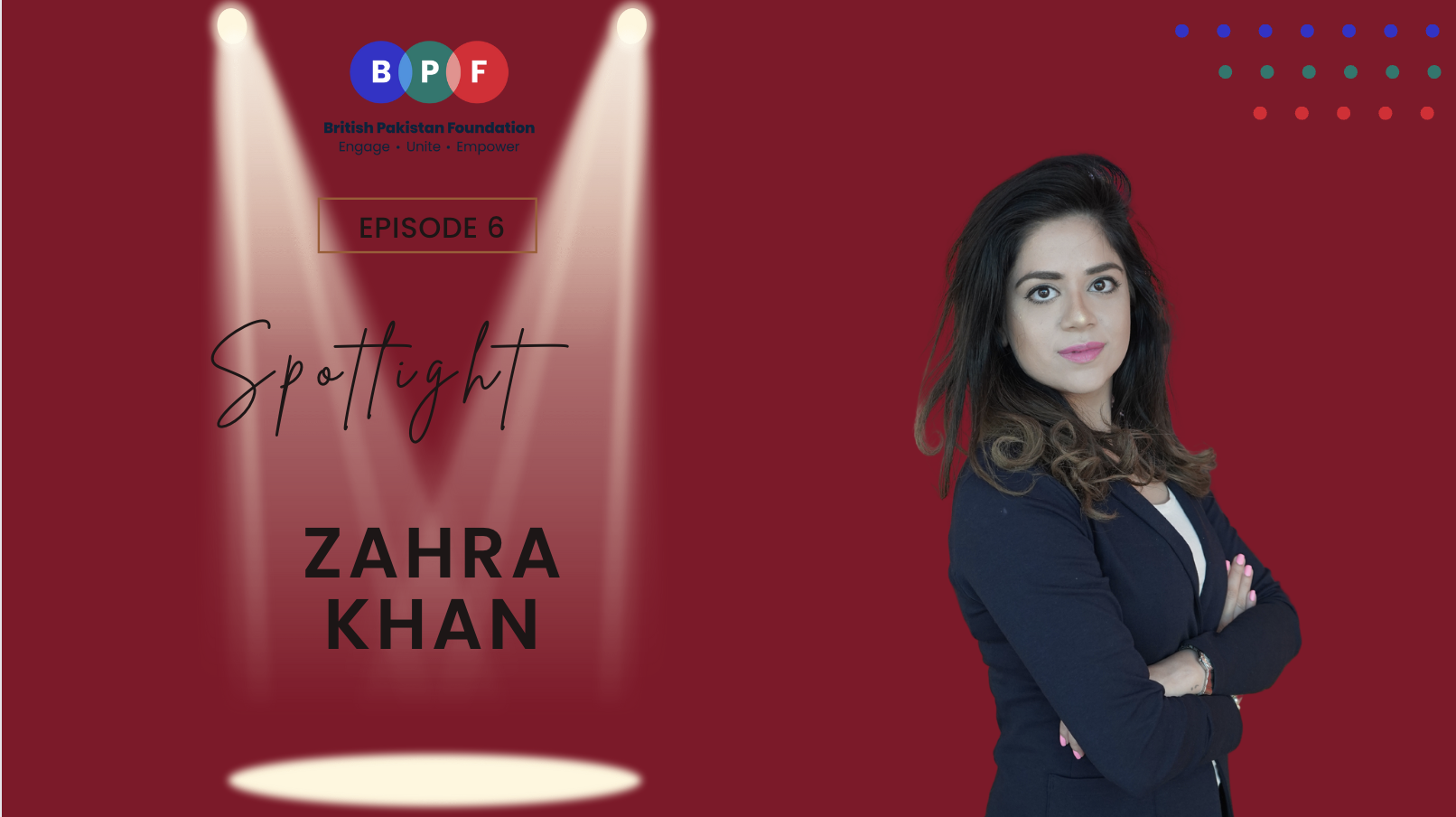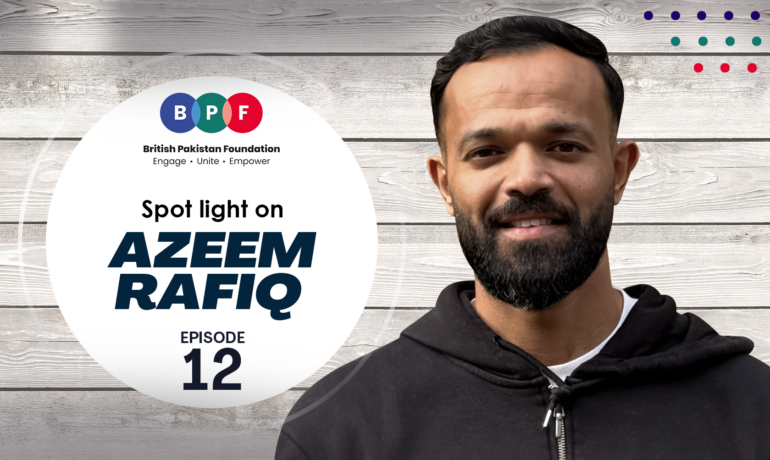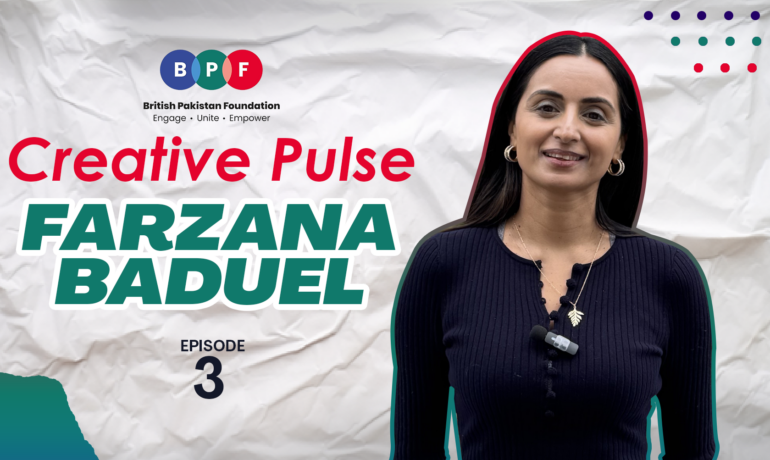Spotlight on Zahra Khan
On episode 6 of the “Spotlight” series, we speak to Chef Zahra Khan.
From baking prodigy to culinary trailblazer, Zahra shares her journey and insights on breaking barriers, empowering women, and revolutionising the culinary scene with Feya Cafe and DYCE.
In a remarkably short time, Zahra has set up two thriving restaurant businesses and developed a retail line of baked goods, all while giving back to the community and empowering women through her enterprises. Watch the video or read below as she takes us through her incredible journey.
Take us through your journey – When and how did you decide that you wanted to get into the culinary business?
This started really young, I was eight years old, when I started baking. My mom used to bake cakes and cupcakes for us at home, and that’s how I got into it. And one day I just said, I’m going to do this myself! So very early on, I got into baking and it became this passion, as it’s something I really enjoyed doing. Then later, I moved to Canada, as a teenager, I got more into cooking. Moving there and going to the supermarket, I realised that there are so many ingredients, so many fruits and vegetables, that were not available in Pakistan. And, that really got me into cooking more. I started experimenting with all these newly found ingredients, and things that I hadn’t heard of before. I think that really fuelled my passion. I got more into it at that point, but at the same time, I was pursuing a career in medicine – studying to become a doctor. I did my pre-medical and my degree in university, and on the side, I kept my baking up. I started doing a business of cakes while I was studying in university. It was just word of mouth through friends and family, and I started getting lots of orders. I started doing wedding cakes as well. Right around that time I graduated, and I thought, is it worth going to med school and spending another 10 years trying to become a doctor? That was just something I didn’t see myself practising. It didn’t bring me the fulfilment that baking and cooking does. At that point I had the really tough conversation with my parents that I don’t want to become a doctor, but I want to become a chef instead. It took some convincing, almost took an entire year. I researched the culinary school and I decided that I’m going change career paths and think of this professionally.
How did you decide on moving from Pakistan? Do you think the move was worth it? And how has the journey been so far?
I think the move was great. Especially being a woman, having grown up in Pakistan, you feel like you don’t have as many opportunities – you’re very sheltered, you’re not allowed to do a lot of things. It’s a bit confined, I would say. So, the move was great. I moved to Canada first as a teenager, and it really opens your eyes to the world. The exposure, that you just don’t get living in Pakistan, there’s just so many different opportunities out there. The best part is that there are no limits – Anything that a man can do, women can do too. And that’s what I really enjoyed. In Pakistan, you are still restricted with your career paths – it’s either you’re a doctor, a lawyer, or an engineer. When I moved to Canada, there were courses that I couldn’t even imagine, such as a carpentry course, woodworking and making furniture, beauty courses, nursing classes, even cooking – all these opportunities, all these different subjects – it really opens your eyes up to the world. That’s what got me thinking that, you know, there’s more that I can do. There are other opportunities out there. So, it was definitely a great move. And I feel like I was lucky to have gotten this opportunity and exposure.
How did you come up with the concept for Feya and DYCE? How did you choose the locations for these?
So, I’ll speak about Feya first. This concept was a childhood dream – when I started baking, I used to dream about having my own bakery one day. And this concept came together over the years as I picked up more experience. It took around two years of researching for the locations in London because back in 2018, when we launched Feya, London was saturated and at its peak – the hospitality industry was booming, you could not find an empty unit in a prime location. So that is something we really struggled with. We did lots of market research, pinpointed areas that would be good for launching this concept. We’d pitch to landlords and the sites would go to bidding, but they would want more experienced operators at the sites, rather than somebody coming in, with no experience in London, a young chef fresh out of culinary school, and then saying, this is my concept. So, it was really hard at first. That was one of the biggest challenges we faced, and we had to put in a hefty deposit to secure the site, the first Feya site, which is just by Bond Street Station, and in the end it was all worth it. It was obviously a new concept, and we were just starting out, but it all just came together. I looked at what was missing in the market, I did my research, and it was extremely competitive. There were lots of cafes out there. And Feya brought this revolution in food using the edible flowers, which back in 2018, we were the pioneers for and started this trend, because none of the other cafes or restaurants were doing it to the extent that we were. We started adding edible flowers into our food as part of healthy eating as they are considered super foods. Most of our menu was focused on super foods and healthy eating, no artificial flavours or preservatives. We kind of brought about this revolution using edible flowers to fuel that into the floral theme of Feya.
For DYCE, we actually got lucky because the unit right next to Feya became available. And then we pitched this concept, which was missing in the market. And honestly, that was a personal passion – When I was living in Canada, I loved bubble tea. And I thought that one day I can have my own bubble tea shop as I was literally drinking it every day. I think that kind of fuelled that passion that you know what, I can do this, I can have my own bubble tea shop. And that’s how DYCE came about. It was basically this idea of doing ice cream, basically simple desserts that you can build by yourself – you could choose a base, such as a brownie or Baklava, and then add an ice cream flavour and then do toppings. Because you can add all sorts of toppings, it becomes really Instagrammable. Also, because then the customer is creating their own dessert, so they take pride in it, and they share it on social media. Because back in 2018, it was all about Instagram and social media. So for both of our concepts, we had to make sure that there was something Instagrammable about it, people should be talking about it. The food was like a piece of art. And that’s sort of what got the momentum started on social media and it really helped the brands to take off.
Being a woman in a male-dominated culinary world, that too from a minority community, what kind of challenges have you faced?
So, it hasn’t been easy. When I went to culinary school, here in London, UK’s oldest Cookery School, in the history of the school, I was the only female Pakistani student to ever attend! And to me, I mean, it came as a bit of a surprise because, yes, I know the culinary industry isn’t female oriented. Especially in Pakistan, women are just expected to cook for the household and women are looked at more like as traditional cooks. You don’t expect women to go out there set up their own restaurants – It’s more like you must cook for your family. And it was that kind of stereotype that I wanted to break. There were challenges that came with it not being a very female friendly industry. When I was in Canada, I was sort of dipping my toe into the water, and I wanted to experience the culinary world. While I was still studying medicine, I wanted to explore working in a restaurant. To know how it was working in a restaurant and just get a feel for it. I started working on the side in this restaurant, which was super busy and amongst the top five restaurants in Toronto. And obviously, the kitchen was a manic and I remember how awful it used to be. It was a completely male dominated kitchen – it was an extremely busy restaurant so it was so stressful. There were all these men, six foot tall, and then there was me, looking like a shrimp. They were swearing – it was just the worst kind of environment for a woman to be in. And I remember the shifts would finish at 2am or 3am – just being on my feet all day in the kitchen, trying to get everything done. It just kind of was very disheartening – I remember just thinking, this is not what it should be like and I don’t want to do this. Taking from that, yes, I was disheartened, but then I knew what the Feya kitchen should not look like. That’s what I’m trying to create and making sure that it’s not stressful. Yes, obviously, you have to manage time and have your orders come out quickly – you don’t want to customers waiting, but it should not be stressful, and women should not feel like they cannot work in such kitchens. So that was my biggest challenge and something that I learned from.
How was your experience of working with Ramona Pintea? And why did you decide to partner with her?
It took a lot of research for the Marble Arch unit. I wanted to collaborate with an artist and create murals because we’ve got really tall ceilings. I came across Ramona and I loved her style and aesthetic. Her wear your crown movement was just something that really caught my attention because it aligns with Feya’s core values and our mission to empower women and to reduce gender pay gap. It was just amazing, finding somebody with the same sort of values and same synergies. It was crazy having these huge murals as she’d never done murals of the size before. She worked day and night to get it all done. She is from Romania, so when she came to London, she was shocked to see the size of the walls even though we had already shared dimensions. It was quite a big project and she had to be up on the scaffolding for painting. It took her a week to complete both the murals. I think she did a fantastic job.
You have also partnered with many celebrities and influencers – Which collaboration has been your favourite so far?
I think it’s hard to pick one because Feya has collaborated with loads of brands. We been featured on television, iTVs Made in Chelsea. We have worked with Vogue and BBC. We partnered with Jennifer Lopez makeup artist Scott Barnes recently. With any collaboration, they expect you to match the theme of their brand and they want the food to be a certain theme or colour – That’s been very interesting. I’m the head chef behind Feya, so I’m given the challenge to create food to match the brand’s aesthetic. So beauty brand collaborations have been always been amazing. We’ve done complete cafe takeovers as well – We did a recent one with Florence by Mills, by Millie Bobby Brown which was great. They took over the entire café and launched the beauty brand and so that was something which was great as well. We have done Royal Ascot and London Fashion Week collaborations as well. We’ve catered a few times in Vogue House and that has been amazing as well.
Your retail line of baked goods changed the way Europe shopped during the pandemic – how did you come up with the concept, and how successful was it?
So 2020, when the pandemic hit, and we were locked down, we had just launched our second Feya site at the Knightsbridge location at the end of 2019. Just three months later, we were locked down and we have no idea how long it was going to last and how long the cafes were closed for. It was just very unpredictable and a very uncertain time. And that actually gave us the time to work on this retail line, which was something at the back of our minds always. As a team, we were thinking that we should have our own products. But I think during the pandemic, we actually got a chance to work on that more. So, we commissioned these female artists, and we got this concept together that, it should be retail but with a mission. We started our charity, Feya Cares, and decided that 10% of the profits from the sale of all our products will go towards our charity. And not only that, but each product came with a message of empowerment and motivation. For example, the teas, had the message of self care, so the artwork on these had focus on self-care and there is a message at the back. On the chocolates, it’s reached for the stars. The truffles stand for diversity and so on. So each product actually has a unique message, which we’re trying to convey. As a brand we have always thought about the social responsibility and social impact and made sure that we are doing something to give back to society.
You donate 10% of your profits to Young Women’s Trust – what sort of an impact has your charity made so far?
We’ve been a part of the charity since we first started. We didn’t have the retail line back then or a partner charity, but we were donating our surplus food to those in need. They would come and collect the food that would have gone to waste otherwise, and then they would redistribute this amongst the needy. This has been something that has been part of the brand. We later partnered with a few charities, including Young Women’s trust, they work with women and children. It’s been great to be a part of it and make an impact. We’ve also partnered with British Heart Foundation, and a few other small charities. One of the best parts of the business is being able to give back.
As a British Pakistani, do you believe you were able to break any cultural stereotypes? If so, how?
Definitely! I feel like the biggest one was women being viewed as traditional chefs. So, I think that was one of the biggest ones to break for myself as well that, you can make a career out of this and it’s not just something you can do from home. Because I know now in Pakistan, there’s a lot of women are going on to set up their businesses. And they’re doing it very successfully, but they’re still doing it from home. And I know it’s scary to go out there, to launch yourself, to get your site and to do it more commercially. It is a bit scary and it is easier to do it from the comfort of your home. But it is definitely something that can be done. The other side is that I feel like the business world, even now in Pakistan, it’s not very common for women to just go out there as compared to overseas women, who to set up their own businesses, and to set up and run them successfully. You know, I think that was one that women are still struggling, where I think there’s a lack of confidence or lack of support. But that is something that, women can do, and should be getting more into.
Did you face any challenges setting up such successful businesses in such a short time?
I don’t think any business comes without challenges. There’s always challenges, there’s always going to be setbacks, there’s always going to be obstacles. When we first opened, I had no experience working in London in the restaurant industry and of running my own business. London was a very competitive market – It was very saturated; the hospitality industry was very cutthroat. And no matter how much research you put into making your brand unique and making your offering unique. It’s very hard to stay unique and to set yourself apart, because what happens with us is that Feya started the trend of edible flowers and food, but a lot of other businesses just started copying the trend. And we got lost in the in the flow as people didn’t realise that Feya actually started it all. And then any dishes that you know, for example, our Rose Avocado Toast was something so unique, because we were making a rose out of the avocado. And that was like a Feya originally, and is still one of our best sellers and dishes that are well known. But very quickly, a lot of other cafes started mimicking our dishes and our recipes. And that’s one of the things that you cannot patent your recipes. In a way, it’s good, because then you must keep innovating and constantly evolving your brand. It keeps me going constantly. It does get a bit disappointing to see your dishes copied and being sold at places that are more well established.
One of the other challenges we faced was with the staff. One of the challenges that come with being a female chef, is that a lot of the times the staff did not take me seriously. I was young, it was just much harder to assert myself. And that only came with time and came with experience. And at the beginning, actually just before I launched, I became a mother. So my daughter was born and she was five months old when I opened up Feya. So at that time, it was all about giving young mothers an opportunity, because I was a young mother myself. So what I did was I hired about eight to 10 staff members at the first location. And four of them, especially working in the kitchen, were young mothers, and they didn’t have experience in the kitchen. But I believed that I could give them the experience, and a platform and opportunity. And that was one of the things that actually became a challenge, as I had to teach them a lot. It still is a challenge as I feel in this kind of industry, it’s always going to be and you learn along the way.
How was it being featured in Forbes 30 under 30? Has it made an impact on your culinary journey?
Definitely! I feel like the Forbes recognition was a huge honour. And it just makes the entire journey worthwhile. It provided more motivation for me to keep moving forward. Especially, at a time when we were just coming out of the lockdown, and we were still in the midst of the pandemic – it really provided that motivation to keep pushing forward. Lots of networking opportunities came out of it and gave a great boost to the brand as well. It helped with brand awareness, and we got lots of media coverage as well. So I feel it really helped at a time when the brand really needed it.
How do you empower women through your enterprises?
70% of our work force is female and that is just one of the ways that we are maintaining this. We give them the opportunity and platform – letting them know that if I can do it, they can too. It has been about empowering women, young mothers as well through our charity initiative and retail line. It has been one of our core values to reduce gender pay gap and we activity work towards this. We don’t want there to be a disparity between genders – the pay must be equal.
What advice do you have for British Pakistanis going into the culinary or business field? Especially for British Pakistani Women?
I would say never set limits for yourself. You should find your niche and you should be comfortable with your heritage – use it and derive inspiration from it to keep you moving forward. You can do anything you set your heart to!
Spotlight On Azeem Rafiq
This episode of Outstanding British Pakistanis’ features the inspiring
Creative Pulse: In Conversation with Farzana Baduel
This episode of Creative Pulse features Farzana Baduel, founder




